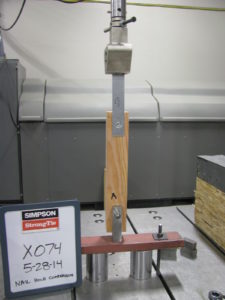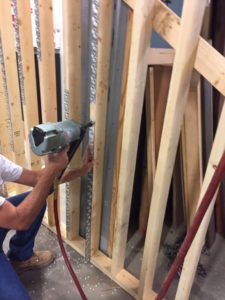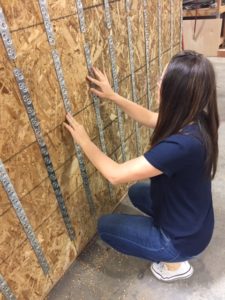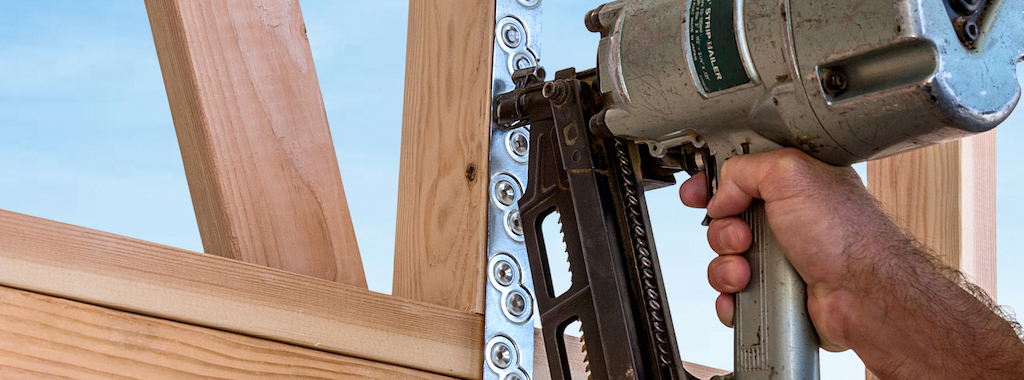CS16 coiled straps. I can’t tell you how many thousands (maybe more) I specified during my time as a consulting engineer. Straps are used everywhere. They were then, and are now, a go-to solution for drag and uplift loads. I didn’t have to look them up in the catalog — I knew the allowable loads by heart.
Then one day at a jobsite, I saw a contractor installing them and thought, “Wow, that is labor intensive. His arm must be so tired!” Suddenly, I felt a little guilty for all of the straps I had personally specified on my projects. I thought there must be a better way. Fast-forward 10 years, and today I’m an R&D engineer for Simpson Strong-Tie, an industry leader that prides itself on offering products that improve construction, keep costs down and allow for a safer built environment. As fate would have it, straps fall into my area of responsibility. Now, thinking about what could be done to improve a flat, steel strap is part of my job. Specifiers use straps load rated based on a National Design Specification® (NDS®) nail calculation and an American Iron and Steel Institute (AISI) steel calculation. How could Simpson Strong-Tie make that better?
 Neelima Tapata, one of our talented fastener engineers, spent a lot of time testing different embossment features providing higher allowable load values for nails when installed in the final feature. Once finalized, the feature accomplished two major goals: higher nail load values and the ability to install nails using most power nailers because it easily fit the nailer’s nosepiece. Contractors would no longer be slowed down by having to change out the tool they were using while framing in order to install a metal connector. This would save installers a lot of time, and, in the construction industry, time is money. This was a breakthrough for Simpson Strong-Tie and the initial steps that allowed us to upgrade our coiled strap. We worked directly with the American Wood Council (AWC) and ICC-ES to seek approval for the innovative embossment. There were many questions, but after we addressed them all, the feature was approved and is now patent pending.
Neelima Tapata, one of our talented fastener engineers, spent a lot of time testing different embossment features providing higher allowable load values for nails when installed in the final feature. Once finalized, the feature accomplished two major goals: higher nail load values and the ability to install nails using most power nailers because it easily fit the nailer’s nosepiece. Contractors would no longer be slowed down by having to change out the tool they were using while framing in order to install a metal connector. This would save installers a lot of time, and, in the construction industry, time is money. This was a breakthrough for Simpson Strong-Tie and the initial steps that allowed us to upgrade our coiled strap. We worked directly with the American Wood Council (AWC) and ICC-ES to seek approval for the innovative embossment. There were many questions, but after we addressed them all, the feature was approved and is now patent pending.
 This was an opportunity to finally upgrade our coiled strap. When we started this project, our goals were to create a strap that would maximize load but also minimize end length, nail quantity and steel thickness while offering ease of installation to the end user. We positioned the innovative embossments in diagonal pairs so the strap could be installed on a 2x piece of lumber. The result was the CSHP high-performance coiled strap. The allowable load for the CSHP18 is 1,540 lb., and for the CSHP20, it’s 1,160 lb. Both provide approximately a 12.5% increase in allowable load over the flat straps of the same gauge and in virtually every application require fewer fasteners.
This was an opportunity to finally upgrade our coiled strap. When we started this project, our goals were to create a strap that would maximize load but also minimize end length, nail quantity and steel thickness while offering ease of installation to the end user. We positioned the innovative embossments in diagonal pairs so the strap could be installed on a 2x piece of lumber. The result was the CSHP high-performance coiled strap. The allowable load for the CSHP18 is 1,540 lb., and for the CSHP20, it’s 1,160 lb. Both provide approximately a 12.5% increase in allowable load over the flat straps of the same gauge and in virtually every application require fewer fasteners.
In addition to the upgrades we made with the embossment, we also added a colored stamp that serves two purposes. The colored marking helps contractors install the strap with the correct face outward, which is important for the embossment feature’s performance.
 When installing the CSHP correctly using a power nailer, the nailer’s nosepiece fits within the innovative embossment and the colored dots are visible. The dots also help inspectors more easily identify the strap: orange dots mark the CSHP18, and black mark for CSHP20.
When installing the CSHP correctly using a power nailer, the nailer’s nosepiece fits within the innovative embossment and the colored dots are visible. The dots also help inspectors more easily identify the strap: orange dots mark the CSHP18, and black mark for CSHP20.
As part of the R&D process, thousands and thousands of nails (of various widths and lengths) were installed using numerous different tools. Contractors who have trialed the product told us, “I wish this product was available now. The install is so easy.” The reviews have been overwhelmingly positive. We are excited to share this new product with you and hope you are able to specify it on your next project.
Learn More About CSHP in Free Webinar
Want to learn more about CSHP? Check out this archived webinar on CSHP high-performance coiled strap and the advantages of using it in the field. Continuing education units are offered for viewing this webinar.


